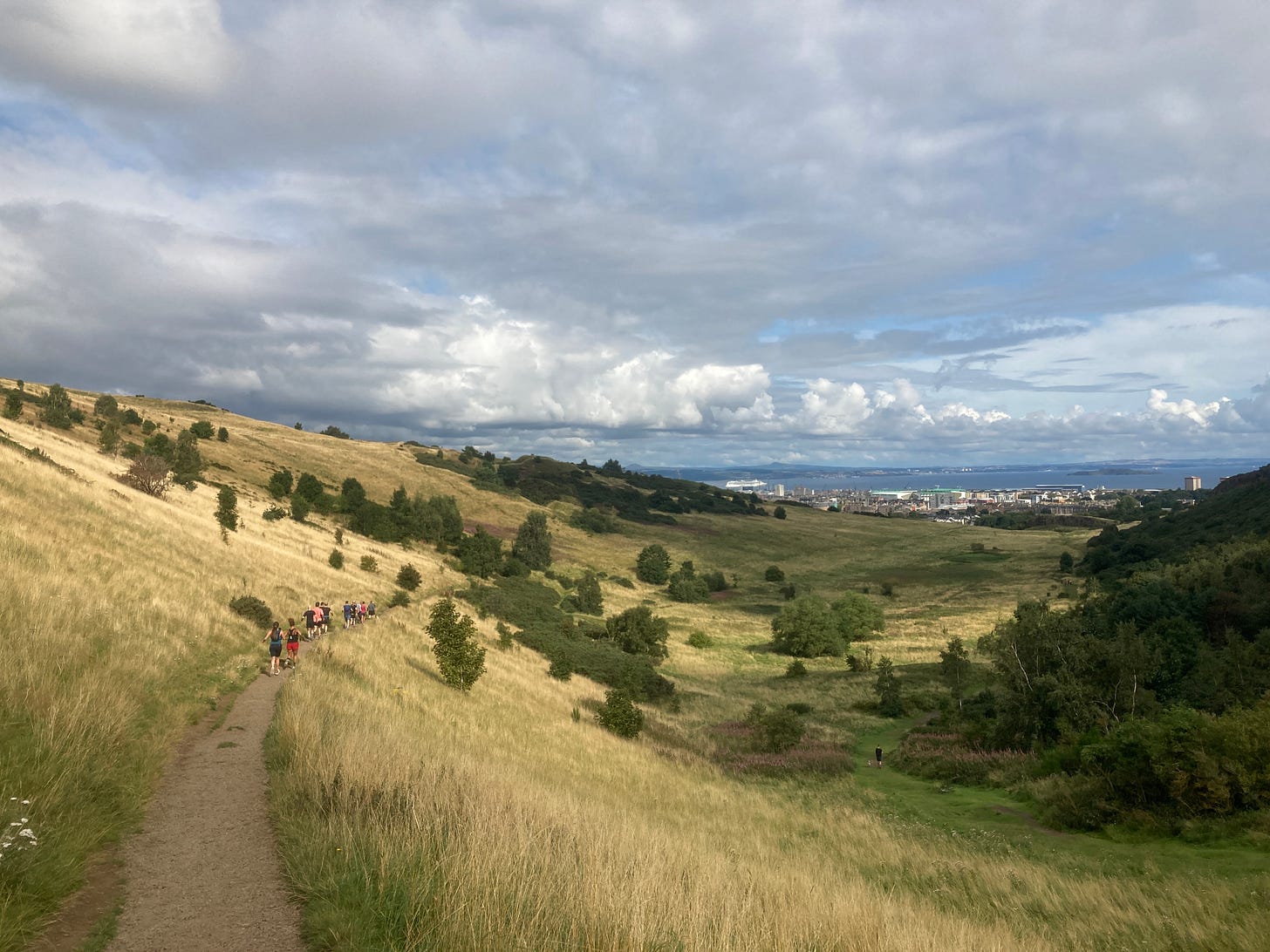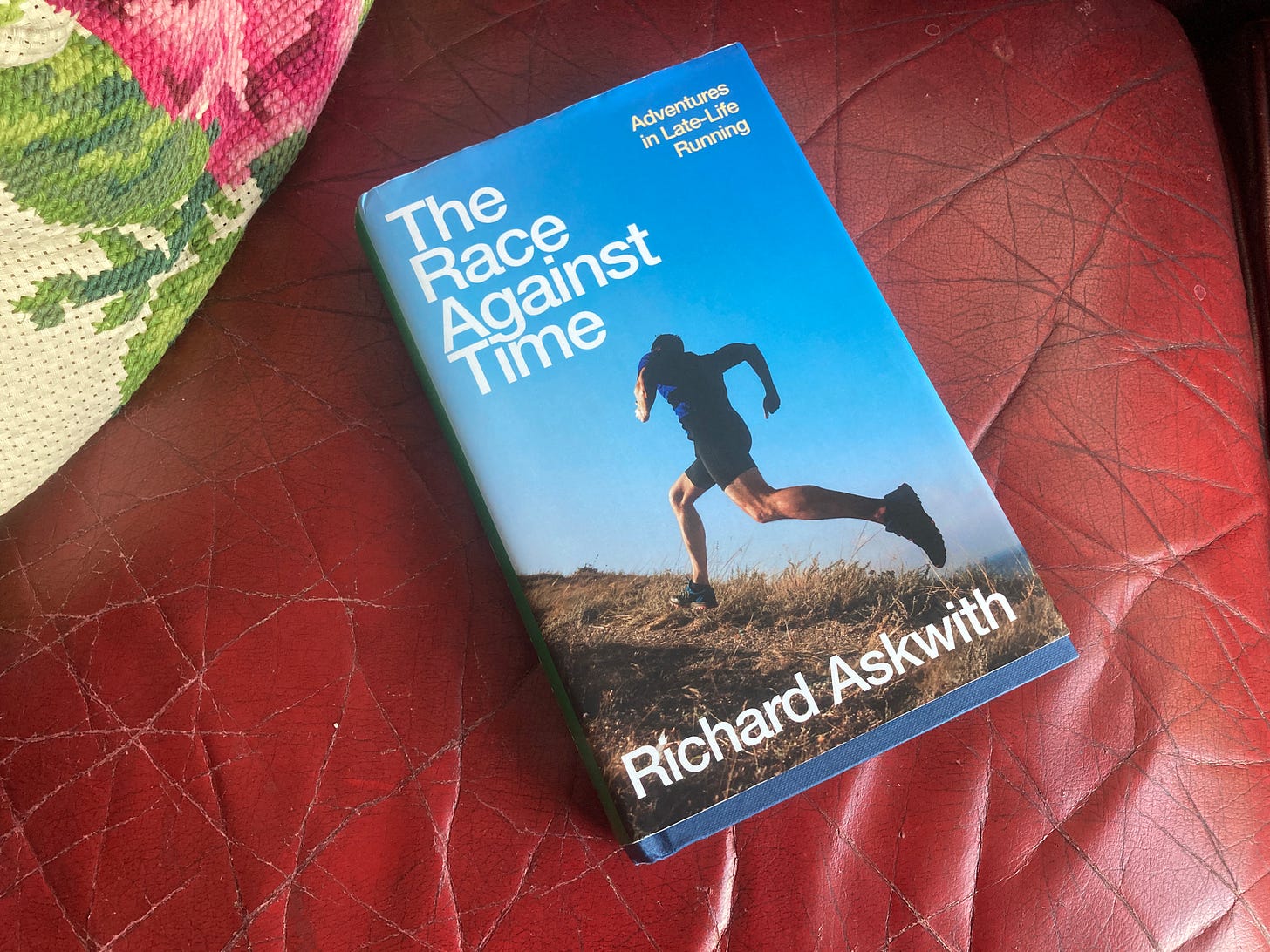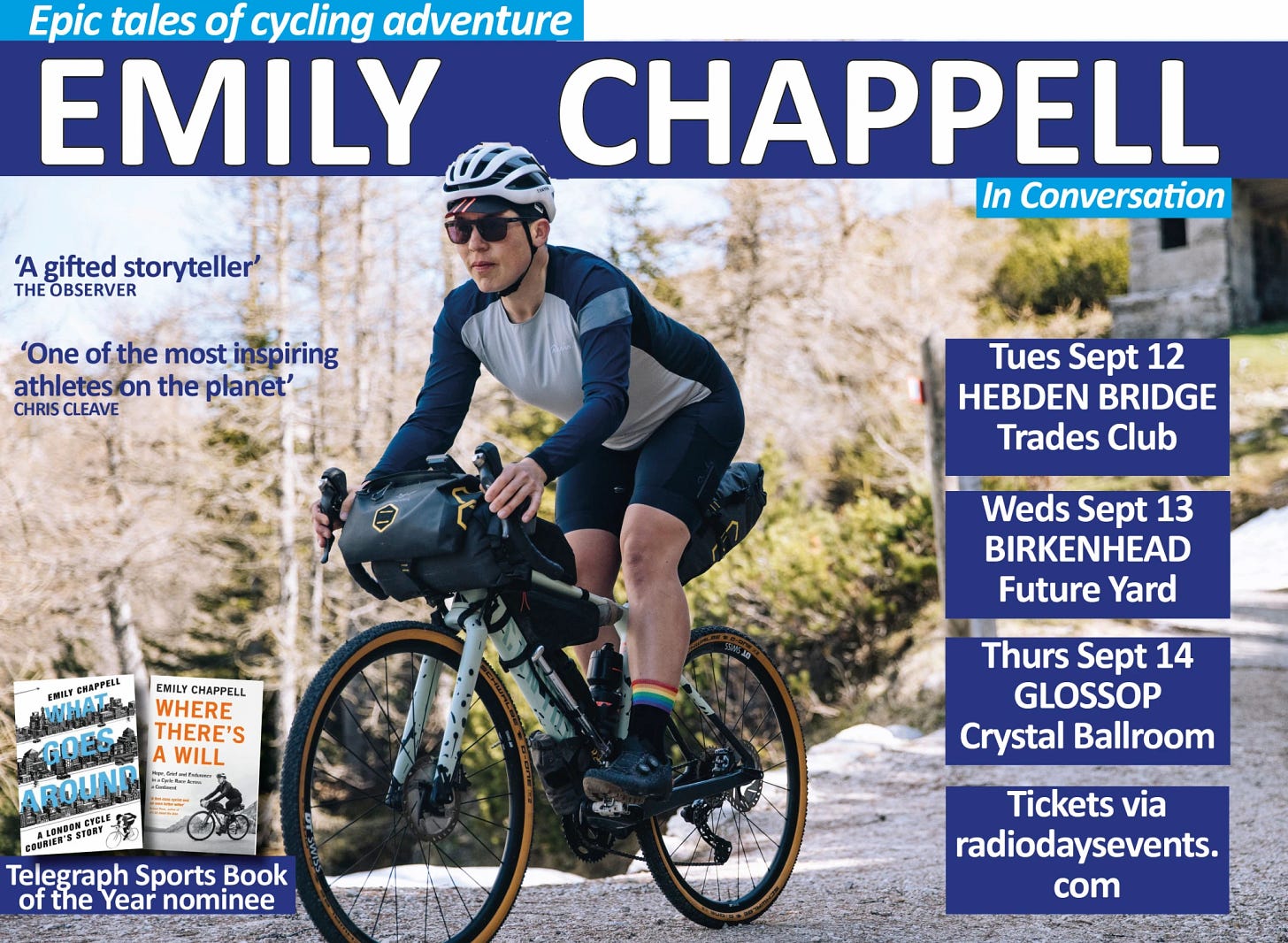Hello friends,
I am writing this in my dressing gown, carefully sequestered from the other inhabitants of the house I’m in. COVID has finally caught up with me. I say ‘finally’, but I’m pretty sure I’ve had it at least twice before, judging from the symptoms I experienced, and my proximity to people who tested positive. This is the first time I’ve seen those two little lines myself though, and for some reason I felt almost happy (vindication? validation? who knows?), then, in the same moment, like I wanted to sit down and have a little cry.

I’m fine though – the symptoms are manageable, I’m taking it very easy, and I’m grateful that this has happened right at the start of a two-week period that I’d deliberately kept clear of work. A week earlier, and I would have had to miss the last weekend of Edinburgh (I would have been heartbroken). A week later, and I might not have been better in time for the small speaking tour I am doing round Northern England in the middle of this month (more details below).
Last week I wrote about my ongoing attempts to stop playing it cool, and to allow myself to enjoy the good parts of my life as they happen, rather than pretending I’m above such things. I’m really grateful for all the comments and messages and other responses I’ve received, and particularly thankful to the person who sent me a link to this enjoyable post from Semi-Rad, which exhorts us to “practise maximum enthusiasm,” which I think I’ll find a useful catchphrase.
Really, the message within all this is not complicated, or ground-breaking, or anything we haven’t heard a thousand times before. It’s a reminder to value the moments of our lives when we are not unhappy, or in pain, and to enjoy them as they pass, rather than leaving it up to nostalgia. But this is one of those lessons many of us need to learn again and again, year after year, adjusting its focus and editing its emphasis as we get older, and our life experience piles up.
So this week’s newsletter (my free-to-all-subscribers monthly round-up) continues in much the same vein.
Ask Emily
This is my monthly agony aunt column, in which I answer your questions about bikes, travel, hopes, fears, and anything else that google won’t help with. If you’d like to submit a problem, get in touch (you can do so by responding to this email), and I’ll answer your question in a future newsletter.
I have a question. I love cycling, it blows my mind that I can get to far away places using only my leg power (madness)... I do however compare myself with others a lot, especially men, and struggle as a result. Is that something you have experienced? Any tips? I'm driving myself mad!
Comparison is the thief of joy, or so they say. I agree only up to a point, because yes, comparing yourself to people who are constantly ahead of you, or the people on Instagram, or people with whom you haven’t a hope of competing, is normally a terrible idea, and will not lead to happiness.
But also… one of the joys I’ve consistently found in cycling is the progress I make, whether it’s being able to get down a trail that previously terrified me, or getting to the end of a long day in the saddle, thinking about where I was that morning, and marvelling at how far I’ve come, and how much has changed.
A few years ago, shortly after I had returned from my big ride across Asia, I found myself riding up one of the steep roads that leads up to Crystal Palace in London, on a fixed-gear bike I had borrowed from a friend. It was cold and dark, and I was feeling utterly miserable: the post-trip depression was in full swing. I hadn’t cycled much since I arrived in Tokyo, a couple of months previously, and it felt as though any fitness I might have gained on my long tour had long since left me. This hill had always challenged me, and I was worried that this time I might not even make it all the way up, or that I would suffer horribly in my attempt, and feel even more miserable as a result.
But instead the hill turned out to be easier than I had remembered. Every push of my legs translated readily into smooth upward motion, and I was barely even out of breath. It was as though I had found another gear. I still felt decidedly unathletic compared to my former self. But somewhere, underneath the misery, was a greater strength than I knew I possessed, forged over many months of riding a laden touring bike through deserts and over mountain passes. It hadn’t all been a waste. For one brief moment, the clouds lifted, and I felt better.
When I’m giving training advice (something I am very much not qualified to do, but people still ask), one of the things I recommend is finding a local hill, or perhaps a time trial course, that you can return to fairly often, and use it to track your progress. Because sometimes, even when we’re feeling exhausted/unfit/slow, we’re actually getting faster and stronger.
But of course, what this doesn’t take into account is the fact that all of us will experience variations in strength and fitness over our lifetime. I’ll admit that I feel a bit doleful when I compare my cycling fitness now to what it was in 2016, when I seemed to spend most of my time on the bike, and a 300km day was as nothing to me. That said, I’ve never been running faster than I am now – I got a 5k PB last week, without even meaning to.
I realise that I’ve written for several paragraphs without offering any actual tips for overcoming the tendency to compare. But I’m not sure if it’s ever possible to do this. We naturally compare ourselves to other people, and to our past and future selves – it’s part of how we put ourselves in context, and understand who we are. However, if it’s getting to the stage where it’s making you miserable, what I’d suggest is that you try to refocus your range of comparison.
It's not intrinsically unhealthy to pick a friend or clubmate, and secretly make it your aim to do better than them – we’ve all been there, I’m sure. It only becomes a problem if this starts to affect your enjoyment of the sport. I signed up to Strava a few years ago, when I kept a Festive 500 diary for Total Women’s Cycling, and almost immediately knew that this was a bad idea. Every single ride now became a sprint, as I tried to gather as many QOMs as possible, and whenever I got an email telling me someone had beaten my time on a segment, it ruined my day. I was no longer able to enjoy the scenery, or slow down when I felt tired. Strava was bringing out the worst in me, and competition was dominating my bike rides, and I knew I had to stop this. Nowadays I only use it to track my runs, and have about five followers. My rides are my own again.
I’m not sure exactly what sort of cycling you do, or whether such a shift will be possible (if you’re racing, I guess it’ll be much more difficult to avoid ranking and documentation of results), but is there a way you can look at things differently? I know it’s the typical hippy-dippy thing I would say, but would it be possible to focus more on the joy and wonder you’ve said you get out of cycling? If it’s difficult to crowd out the urge to compare, then perhaps you could start off with some exercises – like writing down ‘three things that went well’ (or similar) at the end of every ride – to try and shift the way you think about the time you spend on the bike.
I spoke to a very accomplished track cyclist recently, and despite the fact that she clearly loved winning, she told me that her favourite races were the ones where she got to experiment and take risks, even if that meant she didn’t end up crossing the line first. There is so much more to cycling than just ‘furthest and fastest’. Another thing you might ask yourself, at the ends of your rides is ‘did I try anything new?’ Or perhaps, ‘did I take any risks?’[1] Or, ‘did I learn anything about myself?’
I don’t think it’ll ever be possible to fully avoid comparison. But I do think we can try to find other directions to push our minds in, when those thoughts creep in. Almost without my intending it, my monthly book recommendation explores a similar question, so do read on, if you want to enjoy the wisdom of someone far more experienced than I am.
Book recommendation
This month’s reading suggestion is one of the seven books I read for my work at the Edinburgh Book Festival. All of them were wonderful, and I’ve been quoting and recommending them left, right and centre. But, unexpectedly, the one I seem to mention most is Richard Askwith’s The Race Against Time.
In case you haven’t come across him, Askwith has had a long and illustrious career writing about running, starting with Feet In The Clouds, which was published back in 2004, and introduced the general public to the obscure and fascinating sport of fell running. People frequently use words like ‘cult’ and ‘classic’ when referring to it.
He’s now in his mid-sixties, and has had to slow down a bit. The Race Against Time is the story of how he came to terms with that. At the start he is experiencing something of a mid-life crisis. Having run seriously for most of his adult life, he finds he can’t measure up to the athlete he was a decade previously. He is frustrated by constant injuries, and many of his fellow runners have dropped out of the sport – for reasons of injury, illness, and other inevitable life challenges. He contemplates giving up entirely, but worries about how he’ll cope with losing something that has been so foundational to his identity – and so instrumental in maintaining his mental health.
You’ll very rarely see anyone over 40 competing in the Olympics or World Championships. There are all sorts of physiological reasons (which Askwith goes into in the book) why our bodies are generally unable to produce their absolute top powers and speeds once we’ve lived in them a certain amount of time. But many of us are still capable of extraordinary athletic feats. (If you’re interested in that sort of thing, there’s also a certain amount of detail on how we need to train differently as our bodies age, much of which was surprising to me.)
First, Askwith takes us to Bushy Park parkrun, where there’s an annual gathering of runners over 80 – and we share their effervescent delight in meeting and running with each other, and in the simple fact of still being able to.
And then we discover Masters Athletics – something I had barely heard of before reading this book. People can (should they choose to) keep on competing in track and field for the entire duration of their life, and to make this fair and practical, competitors are bracketed into five-year age group, which start at 35. (I would be in the W40 cohort.) The age groups go right up to M/W105, and throughout his book Askwith shares stories of senior athletes whose achievements and life stories are quite frankly mind-boggling. He’s very good at putting them into context, and explaining so that even a layperson like me can understand that the records they are setting are different from those set by a 22-year-old Olympian, but similarly incredible, given the restrictions within which these athletes are operating.[2]
Two things struck me, in Askwith’s portrayal of these senior athletes. The first was how seriously they took their sport. There is very little mainstream representation of active older people, and what there is tends more towards wholesome depictions of rosy-cheeked walking groups. Askwith shows us athletes in their 70s, 80s, 90s (and occasionally 100s) pushing themselves to the absolute limit, grimacing in pain, and roaring with triumph. The competition is real, as is the dedication with which many of them train and prepare.
The second thing was the atmosphere of celebration that seems to hang over these events. No one takes it for granted that they have made it to the start line. Everyone is delighted to see each other, and to have the rare opportunity to spend time with fellow athletes from all over the world, both during their competitions and at the parties afterwards. And although Askwith observes throughout the book that we are all fighting an inexorable decline, he also notes that we can find joy in that fight – and that really, that is our only option, unless we give up. He references Camus’ 1942 essay, The Myth of Sisyphus, which I haven’t yet read, but whose words I recognised from a blog post that Jack Thurston published back in 2016, about the previous year’s concurrent attempts on the Highest Annual Mileage Record.
“The struggle itself is enough to fill a man’s heart,” concludes Camus, “One must imagine Sisyphus happy.”
This blog post made a big impression on me back then, right at the start of my ultra-racing career (I remember sending the link to several people), and it resonates even more loudly now. It would be untrue to say that I haven’t been motivated by results over the last few years; that I haven’t chased numbers (and fellow riders), and tried constantly to be just that little bit better than I was before. But the numbers are really just a pretext – I’ve known all along that what I really want is that feeling of working hard and doing well; of briefly mastering body and distance and gradient, of overcoming laziness and self-doubt, and peering over the horizon of my physical limits. To win without trying hard would feel like no victory at all. Perhaps this explains why I’ve sometimes felt a greater sense of reward after races I didn’t complete, and why so many of my journeys have been unfinished.
I hadn’t fully realised I was having a small mid-life crisis of my own, until this book sent a wave of hope surging through me. I don’t know if my greatest athletic achievements are already behind me (I was already aware that, in endurance sports, women can remain competitive well into their sixties), but I think perhaps some small part of me fears that they are – or at least, doubts that she will ever again have the time, energy and determination to take on something as big as what I’ve done in the past. The Race Against Time showed me, more convincingly and comprehensively than I’ve seen thus far, that it will be possible for me to find challenge, satisfaction, solidarity and personal fulfilment in sport for many years to come, and that – as I think I already knew – the joy I’m seeking will lie in the struggle itself, rather than any fleeting results.
Upcoming Appearances
I have a busy month ahead of me (assuming I’m back on my feet in reasonable time).
Next week Duncan Steer and I will be doing one of our mini-tours, this time around Northern England. Do come and see us, if you’re near any of these places. Duncan is a superb interviewer, and we always have a lot of fun.
Tuesday, 12th September - Hebden Bridge (details here)
Wednesday 13th September - Birkenhead (details here)
Thursday 14th September - Glossop (details here)
I’m told the Hebden and Glossop events are close to selling out, but Birkenhead still has a few extra seats going - so if you know any Merseyside folks who might be interested, feel free to forward them this email.
And I believe there are still one or two places left for the LGBTQIA+ Intro To Bikepacking weekend that I’ll be hosting along with the fabulous people from Sisters In The Wild, at the end of this month. See you there?
That’s all for now - catch you next week!
Emily
[1] By which I mean, the sort of risks that involve going further than you planned and needing to jump on a train – not anything that might endanger life and limb!
[2] While you’re waiting for Askwith’s book to be delivered, I’d strongly recommend looking at the work of Alex Rotas, a photographer who has spent the last decade documenting older sportswomen and men. There are some amazing galleries on her website, and a very good six-minute film about her work, made by Danielle Sellwood.






You write so well Emily. Love reading your posts. Get well soon.
Best wishes, hope you recover well!